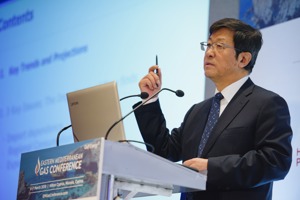EMGC '19: IEF Secretary General calls for resource cooperation in Eastern Med
By Adrienne Blume, Gas Processing & LNG and Hydrocarbon Processing
NICOSIA—At the opening of Day 2 of the Eastern Mediterranean Gas Conference (EMGC 2019) in Cyprus, Dr. Sun Xiansheng, Secretary General of the International Energy Forum, spoke about international and regional energy cooperation and the emerging role of the Eastern Med in global energy.
Major growth in gas through 2040. Dr. Xiansheng noted that fossil fuels will still comprise the major portion of the energy mix through 2040. Renewable fuels will gain ground due to the Paris Climate Accord, despite the pull-out of the US from the Accord.
"Energy will be greener, more low-carbon and more sustainable—that's the trend," he said. The growing electricity market will benefit from further penetration of gas as a preferred, environmentally friendly fuel.
According to the International Energy Agency (IEA) and the Organization of the Petroleum Exporting Countries (OPEC), gas will make up the largest percentage of the energy mix through 2040, over oil and coal. Much of this gas use will come in the form of LNG trade.
Asian countries including China, India, South Korea and Japan will be the major driving force for overall energy demand, as well as gas demand, through 2040. Also, US shale plays will continue to be a major factor in the production and supply of natural gas through at least 2025.
Reserves can enhance regional security. In the Eastern Med, new reserves discoveries may enhance energy security and prosperity, Dr. Xiansheng said. Gas use in the power generation market has improved energy efficiency in the region, and Egypt has shown export viability for LNG when its domestic demand is met.
"If production can be increased in the Eastern Med region, then it will become a major factor in the global gas market and may provide an important source of supply for Europe," the Secretary General said. In particular, as Germany phases out coal use by 2038, the nation will need new sources of gas supply—a possible reinforcement for the Eastern Med's export viability.
"International cooperation for developing Eastern Med resources is very important, but so is adequate investment," Dr. Xiansheng asserted. "Both international and regional cooperation will help put these resources into action."
In closing, the Secretary General noted that the International Energy Forum can provide a natural and energy-specific forum to facilitate negotiations, as well as a secure and transparent environment for investment. It can also encourage the mutually advantageous development of infrastructure and help facilitate dialogue between energy producers and consumers.
Gulf Energy Information's EMGC 2019 is taking place in Nicosia, Cyprus from 6–7 March.

- RWE strengthens partnerships with ADNOC and Masdar to enhance energy security in Germany and Europe
- TotalEnergies and Mozambique announce the full restart of the $20-B Mozambique LNG project
- Five energy market trends to track in 2026, the year of the glut
- Venture Global wins LNG arbitration case brought by Spain's Repsol
- Trinity Gas Storage reaches FID on Phase II expansion




Comments